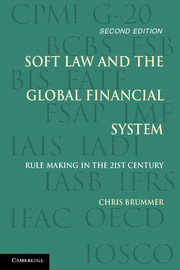Book contents
- Frontmatter
- Contents
- Preface to the New Edition
- Acknowledgments
- Key Abbreviations
- Introduction: The Perils of Global Finance
- 1 Territoriality and Financial Statecraft
- 2 The Architecture of International Financial Law
- 3 A Compliance-Based Theory of International Financial Law
- 4 How Legitimate is International Financial Law?
- 5 Soft Law and the Global Financial Crisis
- 6 Implementing the G-20 Agenda: A Transatlantic Case Survey
- 7 The Future of International Financial Law
- Index
6 - Implementing the G-20 Agenda: A Transatlantic Case Survey
Published online by Cambridge University Press: 05 November 2015
- Frontmatter
- Contents
- Preface to the New Edition
- Acknowledgments
- Key Abbreviations
- Introduction: The Perils of Global Finance
- 1 Territoriality and Financial Statecraft
- 2 The Architecture of International Financial Law
- 3 A Compliance-Based Theory of International Financial Law
- 4 How Legitimate is International Financial Law?
- 5 Soft Law and the Global Financial Crisis
- 6 Implementing the G-20 Agenda: A Transatlantic Case Survey
- 7 The Future of International Financial Law
- Index
Summary
Securing global financial standards can be difficult due to countries’ varying political and economic priorities. And even after regulators strike agreements internationally, the degree to which standards are implemented on the ground can depend on the evolving interests of the relevant country and the disciplinary tools employed. For this reason, commentators continue to debate whether and to what extent soft law can truly help coordinate interests among regulatory authorities, especially powerful ones.
With this in mind, this chapter provides a closer look at the implementation of the G-20 agenda in the European Union and the United States, the world's largest and most important regulatory jurisdictions. By surveying and providing context to key aspects of the transatlantic implementation of the G-20 agenda, we will see how both governments have, to an overwhelming degree, moved in lockstep with one another with their regulatory reforms, even when the impact of reforms curbed the size and likely profits of their respective financial centers.
That said, the chapter also notes and identifies varying sources of friction that have arisen during the implementation process. Interestingly, the most salient disagreements have, however, not emerged in pursuing compliance, although backtracking on some commitments has occurred on the margins. Instead, many vociferous disputes have arisen when the EU or the US has sought to “overcomply” with international standards by gold-plating regulations in ways that surpass international best standards, and then leverage territorial (and even extraterritorial) tactics to push domestic policy measures abroad. Yet critically, in cases both of non- and of over compliance, soft law standards have been key to cross border-dialogue, and often serve as the baseline against which national regulatory policies are justified and exported to other jurisdictions.
A Brief Overview of Transatlantic Regulatory Processes
Before moving to a substantive evaluation of the implementation of G-20 reforms, it is worthwhile first to provide an overview of the procedural frameworks in both jurisdictions. Although the US and EU are often seen as the two leading regulatory superpowers and as sharing similar open market economies, especially when compared to some other members of the G-20, their rule-making processes differ considerably. These differences can lead to divergence in both the timetable and content of rules across the Atlantic – even where both are responding to the same global regulatory agenda.
- Type
- Chapter
- Information
- Soft Law and the Global Financial SystemRule Making in the 21st Century, pp. 276 - 325Publisher: Cambridge University PressPrint publication year: 2015



